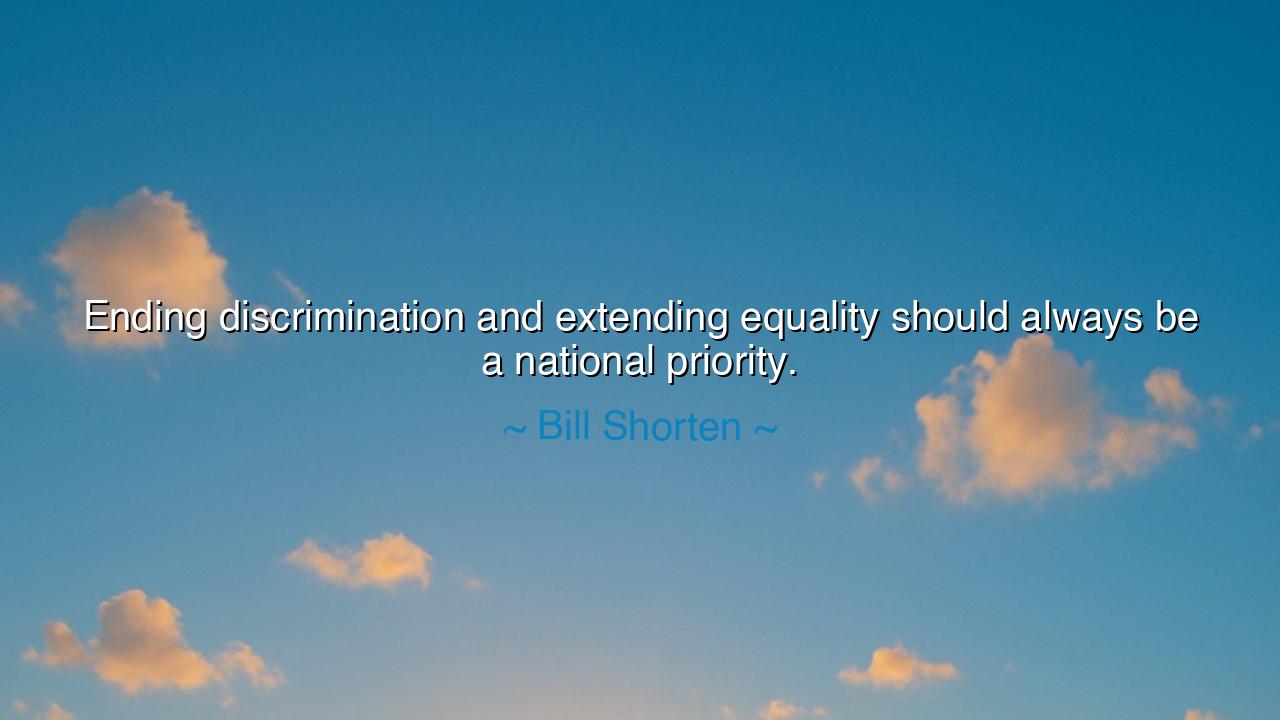
Ending discrimination and extending equality should always be a






“Ending discrimination and extending equality should always be a national priority.” These words of Bill Shorten, an Australian statesman and advocate for social justice, rise like a solemn vow — a reminder that the true measure of a nation is not its wealth, nor its power, but its fairness. In these few words, Shorten binds together the ancient ideals of justice, compassion, and unity. He speaks not of charity, but of duty — the sacred responsibility of every society to lift the weight of prejudice from its people and to ensure that all may walk in dignity beneath the same sun.
The origin of this truth lies not in one country or one age, but in the very heart of civilization itself. Since the dawn of recorded time, humankind has struggled between the instinct to divide and the wisdom to unite. Discrimination — in race, in creed, in gender, in class — has always been the poison that weakens the human spirit. Yet the pursuit of equality has been its antidote, the steady light guiding nations toward maturity. When Shorten declares that equality must be a national priority, he joins the chorus of the wise who have understood that freedom without fairness is an illusion, and progress without compassion is hollow.
To end discrimination is not merely to pass laws or issue decrees; it is to heal the moral fabric of a nation. Laws may restrain injustice, but only hearts can undo it. Every act of exclusion — whether in whispered prejudice or open hate — diminishes not only the victim but the soul of the country itself. A nation divided against its own people cannot endure, for injustice corrodes the foundations upon which peace is built. The ancients taught that a city cannot stand if it fails to honor the humanity of its citizens; for the gods — or the universe itself — withdraw favor from those who deny justice to their own.
History, both ancient and modern, bears witness to this truth. Consider the story of Nelson Mandela and the struggle against apartheid in South Africa. For decades, an entire race was bound under the chains of discrimination, denied the simplest rights of equality. Yet Mandela, emerging from twenty-seven years of imprisonment, did not call for vengeance, but for unity. He knew that only by ending discrimination could his nation be reborn. “If you want to make peace with your enemy,” he said, “you must work with your enemy. Then he becomes your partner.” Through his courage and vision, South Africa began its slow and painful climb toward reconciliation — a living example of what it means to make equality a national priority.
Shorten’s words also echo the struggles of his own homeland, Australia, a country still learning to reconcile with its First Nations peoples. The effort to recognize Indigenous Australians in the Constitution, to close the gap in health, education, and opportunity, is part of this same sacred duty. A nation cannot call itself free while some of its people remain unseen. The extension of equality must be constant and universal — for the moment it stops, injustice begins again. Equality is not a gift to be granted once; it is a flame that must be kept alive through vigilance, compassion, and courage.
And yet, as the ancients would remind us, equality cannot be forced from above — it must also be chosen by the hearts of the people. Each citizen bears the responsibility to reject prejudice in daily life: in words, in thought, in action. The work of justice begins not in courts or parliaments, but in conversations, in classrooms, in acts of kindness that affirm the dignity of others. To end discrimination is to live with empathy; to extend equality is to practice love in public form. When every individual chooses to honor the humanity of another, the collective spirit of a nation rises to greatness.
So let this be the teaching drawn from Bill Shorten’s words: that the highest purpose of government — and of every generation — is to build a society where no one is left behind, no one is looked down upon, and no one is denied their rightful place. Let no leader forget that power finds its noblest use in justice, and let no citizen forget that equality begins with themselves. For the day a nation places fairness above fear, and compassion above convenience, is the day it becomes truly free. And though the road may be long and strewn with trials, those who walk it in the spirit of equality will one day look back and say — we have become the people our ancestors dreamed of.






AAdministratorAdministrator
Welcome, honored guests. Please leave a comment, we will respond soon